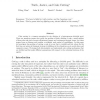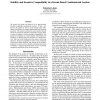116
Voted
AAAI
2010
15 years 2 months ago
2010
We consider risk-sensitive generalizations of Nash and correlated equilibria in noncooperative games. We prove that, except for a class of degenerate games, unless a two-player ga...
AAAI
2010
15 years 2 months ago
2010
Depth-first proof-number search (df-pn) is powerful AND/OR tree search to solve positions in games. However, df-pn has a notorious problem of infinite loops when applied to domain...
75
Voted
AAAI
2010
15 years 2 months ago
2010
AAAI
2010
15 years 2 months ago
2010
Cake cutting is a common metaphor for the division of a heterogeneous divisible good. There are numerous papers that study the problem of fairly dividing a cake; a small number of...
112
click to vote
AAAI
2010
15 years 2 months ago
2010
We present the design and analysis of an approximately incentive-compatible combinatorial auction. In just a single run, the auction is able to extract enough value information fr...
64
Voted
AAAI
2010
15 years 2 months ago
2010
We consider a very natural problem concerned with game manipulation. Let G be a directed graph where the nodes represent players of a game, and an edge from u to v means that u ca...
105
Voted
AAAI
2010
15 years 2 months ago
2010
Relational Markov Decision Processes (MDP) are a useraction for stochastic planning problems since one can develop abstract solutions for them that are independent of domain size ...
110
Voted
AAAI
2010
15 years 2 months ago
2010
Partially-observable Markov decision processes (POMDPs) provide a powerful model for sequential decision-making problems with partially-observed state and are known to have (appro...
113
Voted
AAAI
2010
15 years 2 months ago
2010
With the increasing popularity of location tracking services such as GPS, more and more mobile data are being accumulated. Based on such data, a potentially useful service is to m...
96
Voted
AAAI
2010
15 years 2 months ago
2010
The problem of dividing a sequence of values into segments occurs in database systems, information retrieval, and knowledge management. The challenge is to select a finite number ...



